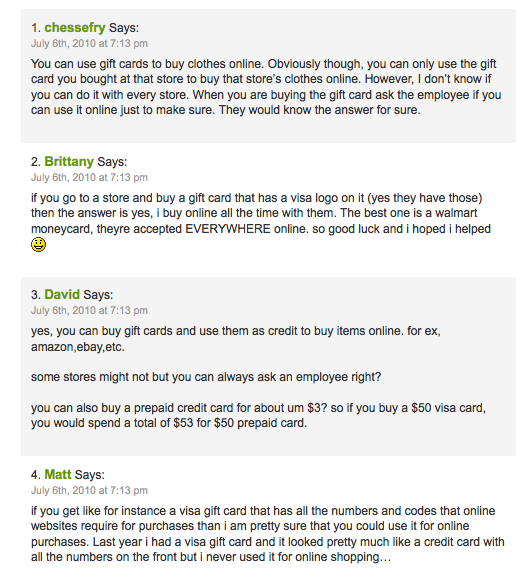Imagine walking through an open-air bazaar in a third world country. People are yelling at you from all sides, groping at you, making outrageous claims about how they have the best deals. Someone might attempt to pick-pocket you. Would you use your credit card at one of these merchants? Not if you were smart, as there is a chance they would steal your number and ring up a bunch of charges.
Well, that happens to be a perfect analogy for the Internet. In general, it is not a safe place to be and there are quite a few people out there that are trying really hard to scam you our of your hard-earned money. That being the case, the general principles of doing ANYTHING on the Internet should be caution and an awareness that things are not alway what they appear.
Let’s look at an example. I recently came across a website that appears to be a Q&A blog where someone asks a question about whether a gift card can be used online. I’ve seen this question about 100 times because open-loop (Visa-type) gift cards can be very difficult to use for online purchases. It is a very good question.
Ok, first red flag, the English is horrible. Now, let’s look at the answers:
Again, some bad English. Notice the time stamp on the answers? What is the likelihood that every single person answered at the exact same time? Not likley.
So this is clearly a bogus site. What is it trying to accomplish?
See all the advertising? In this case the site has been set up purely to drive traffic to their advertising to generate pay-per-click income. But it would be very wrong to assume that every example of a bogus website is as benign as this one. For example, a site like this might exist to drive traffic to a bogus website set up to harvest peoples gift card numbers under the guise of allowing them to check their balance. Setting up a website with what looks like a normal every-day person answering someones question on how to check their gift card balance would appear to legitimize the bogus balance website.
So, when it comes to the Internet (and this includes SPAM emails), remember a couple of things:
- Assume the worst until you know better
- Nothing is for free
- If it sounds too good to be true, it is




RSS